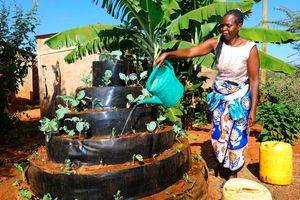Kitchen gardens empower women to boost food security

Women water crops at their kitchen gardens in Kodich,West Pokot County.
What you need to know:
- The project has helped the women from Kodich and Chepareria to plant short season crops and provide food for their families.
Women in West Pokot County have a reason to smile after they benefited from training on setting up kitchen gardens through climate-smart agriculture. The move is aimed at fighting food insecurity and malnutrition.
The project has helped the women from Kodich and Chepareria to plant short season crops and provide food for their families.
West Pokot is one of the two counties with the highest malnutrition rate — it has the highest stunting rate of 35.1 per cent and a wasting rate of 11.0 per cent — according 2022 Kenya Demographic Health Survey.
But at Kodich ward in Pokot North, women under Topolul mother-to-mother support group are changing the narrative through the project spearheaded by Action Against Hunger.
Ms Cheposangiy Lotupai, the group’s’ chairlady , noted that the women have learnt how to make kitchen gardens and grow short season crops not only for own consumption, but as a source of income. Ms Lotupai said the gardens need less water than a typical garden. The women mostly grow vegetables and fruit trees. The county’s Department of Agriculture in partnership with Action Against Hunger has been helping communities to irrigate their kitchen gardens.
From August 1, 2023, the project has focused on five women groups in Kacheliba and Chepareria. So far, 750 residents from vulnerable backgrounds have benefited from the programme, according to Action Against Hunger.
The semi-arid county still experiences recurrent droughts, which, coupled with high poverty levels, limited water access, resource-based conflicts, and other shocks like flooding and disease outbreaks, aggravate the vulnerability of local populations.
Ms Lotupai noted that the project has also enhanced access to safe water for domestic and small-scale irrigation, promoting the production of high-value, nutritious crops at the household level. Lucas Matete, food security and livelihood officer at Action Against Humner, said events like farmers' field days have served as platforms for knowledge exchange, where locals learn about innovative farming techniques amid climate change challenges.
“We have held field days for farmers to learn and interact,” he said.
Simon Nyepus, a beneficiary, noted that through the training , farmers have been able to start small irrigation projects at home.
“Previously, our crops used to fail due to drought and lack of water but since the organisation built a water pond, we have produced crops throughout the year,” noted Mr Nyepus.
Simeon Kiprop from the county’s Agriculture department noted that the project has been a game changer, helping women to produce food through simple and affordable budgets.
“Most women in the grassroots are now able to mobilise themselves to set up kitchen gardens and produce short season food crops, including nutritious vegetables and fruits.





